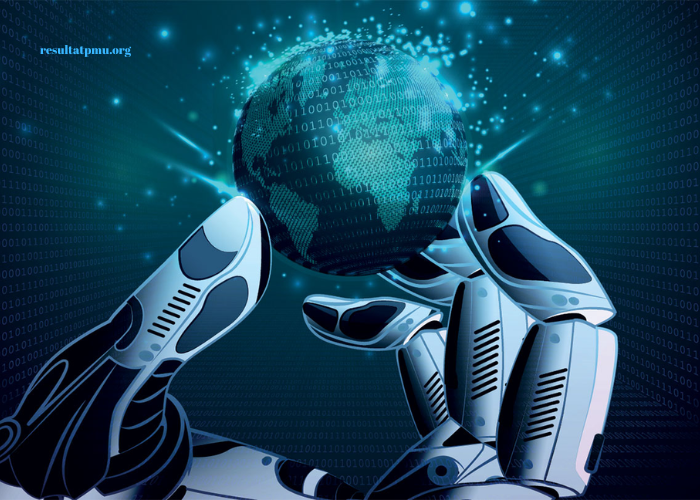Artificial Intelligence (AI) has emerged as one of the most transformative technologies of the 21st century, revolutionizing industries and reshaping how businesses operate. From healthcare to finance, manufacturing to retail, AI is not just enhancing existing processes; it’s driving innovation and creating new business models. This article explores how AI is transforming various sectors, the challenges it presents, and its potential future impact.
Understanding Artificial Intelligence
Artificial Intelligence refers to the simulation of human intelligence in machines programmed to think and learn like humans. This encompasses various technologies, including machine learning (ML), natural language processing (NLP), robotics, and computer vision. AI systems can analyze vast amounts of data, identify patterns, make decisions, and improve over time without human intervention.
Key Components of AI
- Machine Learning: This subset of AI focuses on developing algorithms that allow computers to learn from and make predictions based on data. It includes supervised learning, unsupervised learning, and reinforcement learning.
- Natural Language Processing: NLP enables machines to understand, interpret, and respond to human language, facilitating interaction between humans and computers.
- Computer Vision: This technology enables machines to interpret and make decisions based on visual data, allowing applications like facial recognition and image classification.
- Robotics: AI-powered robots can perform tasks autonomously or semi-autonomously, often in environments that are hazardous or difficult for humans.
AI in Healthcare
The healthcare industry is one of the sectors experiencing significant transformation due to AI. By leveraging data, AI can enhance patient care, streamline operations, and reduce costs.
Enhancing Diagnosis and Treatment
AI algorithms can analyze medical images, such as X-rays and MRIs, with remarkable accuracy, often surpassing human radiologists. For instance, Google’s DeepMind has developed AI systems capable of detecting eye diseases and cancers at early stages, leading to timely interventions.
Personalized Medicine
AI enables personalized medicine by analyzing genetic data and identifying individual treatment options. For example, AI can predict how patients will respond to specific medications, allowing healthcare providers to tailor treatments that minimize side effects and maximize efficacy.
Drug Discovery
The drug discovery process is traditionally time-consuming and costly. AI can expedite this process by simulating how different compounds will interact with target proteins, identifying promising candidates for further testing. Companies like Atomwise are using AI to screen millions of compounds quickly, significantly reducing the time needed to bring new drugs to market.
Operational Efficiency
AI is streamlining administrative tasks in healthcare, such as scheduling appointments, managing patient records, and processing insurance claims. By automating these processes, healthcare providers can reduce administrative burdens and focus more on patient care.
AI in Finance
The financial industry is rapidly adopting AI technologies to enhance decision-making, manage risk, and improve customer experiences.
Fraud Detection
AI systems analyze transaction patterns in real-time to detect anomalies that may indicate fraudulent activity. By learning from historical data, AI can identify potential fraud cases more accurately than traditional methods. For example, banks like JPMorgan Chase use AI to monitor transactions and flag suspicious activities.
Algorithmic Trading
AI algorithms can analyze market data at lightning speed, allowing for more efficient trading strategies. These systems can react to market fluctuations and execute trades within milliseconds, often outperforming human traders. Hedge funds and investment firms are increasingly relying on AI-driven trading algorithms to maximize profits.
Customer Service
Chatbots powered by AI are revolutionizing customer service in the finance sector. These virtual assistants can handle a wide range of inquiries, providing instant support and reducing the need for human intervention. This enhances customer satisfaction and allows financial institutions to operate more efficiently.
Risk Assessment
AI is transforming risk assessment in finance by analyzing a broader range of data points. Traditional credit scoring relies on limited information, while AI can evaluate alternative data sources, such as social media activity and online behavior, to provide a more comprehensive risk profile.
AI in Manufacturing
AI is redefining manufacturing processes, driving efficiency, and enabling smarter production systems.
Predictive Maintenance
AI can predict equipment failures before they occur by analyzing data from sensors and machinery. This predictive maintenance approach reduces downtime, extends the lifespan of equipment, and saves costs. Companies like Siemens use AI-driven analytics to monitor machinery and anticipate maintenance needs.
Quality Control
AI-powered vision systems can inspect products for defects during the manufacturing process, ensuring quality control. These systems can identify issues that human inspectors might miss, leading to higher-quality products and reduced waste.
Supply Chain Optimization
AI enhances supply chain management by analyzing data from various sources to improve forecasting and inventory management. By predicting demand more accurately, companies can optimize production schedules, reduce excess inventory, and lower operational costs.
Robotics and Automation
The integration of AI with robotics is transforming the manufacturing landscape. Collaborative robots (cobots) work alongside human workers, performing repetitive tasks and enhancing productivity. This automation allows workers to focus on higher-value tasks, fostering innovation.
AI in Retail
The retail industry is undergoing a transformation driven by AI, enhancing customer experiences and optimizing operations.
Personalized Shopping Experiences
AI analyzes customer data to provide personalized recommendations and offers. E-commerce giants like Amazon use AI algorithms to suggest products based on a customer’s browsing and purchase history, enhancing the shopping experience and driving sales.
Inventory Management
AI helps retailers optimize inventory levels by predicting demand and automating restocking processes. This reduces the risk of stockouts and overstock situations, ensuring that products are available when customers want them.
Customer Service and Support
Chatbots and virtual assistants powered by AI provide 24/7 customer support, answering inquiries and assisting with purchases. This enhances customer satisfaction and reduces the burden on human customer service representatives.
Visual Search
AI-driven visual search technology allows customers to search for products using images rather than text. This innovation streamlines the shopping experience, enabling customers to find products quickly and efficiently.
AI in Transportation
AI is transforming the transportation sector, enhancing safety, efficiency, and sustainability.
Autonomous Vehicles
Self-driving cars leverage AI to navigate and make decisions in real-time. Companies like Tesla and Waymo are leading the charge in developing autonomous vehicles that promise to reduce traffic accidents and improve mobility.
Traffic Management
AI algorithms analyze traffic patterns and optimize traffic signals to reduce congestion. Smart traffic management systems can adapt to real-time conditions, improving overall traffic flow and reducing commute times.
Route Optimization
AI-driven navigation systems provide real-time route optimization, taking into account traffic conditions, weather, and other factors. This helps drivers choose the most efficient routes, saving time and fuel.
Supply Chain Logistics
AI enhances supply chain logistics by optimizing delivery routes and schedules. Companies like UPS use AI to analyze data and make data-driven decisions, reducing transportation costs and improving delivery times.
Challenges and Considerations
Despite its transformative potential, the widespread adoption of AI presents several challenges and considerations.
Data Privacy and Security
The reliance on vast amounts of data raises concerns about privacy and security. Organizations must implement robust data protection measures to safeguard sensitive information and comply with regulations like GDPR.
Ethical Concerns
The deployment of AI raises ethical questions, particularly regarding bias in algorithms. Ensuring fairness and transparency in AI decision-making processes is essential to avoid perpetuating existing inequalities.
Job Displacement
While AI creates new opportunities, it also poses a risk of job displacement. Workers in certain industries may find their roles automated, necessitating reskilling and upskilling initiatives to prepare the workforce for the future.
Regulation and Governance
The rapid pace of AI development calls for regulatory frameworks to ensure responsible and ethical use. Policymakers must collaborate with industry leaders to establish guidelines that foster innovation while addressing potential risks.
The Future of AI Across Industries
The future of AI holds immense potential for further innovation across industries. As technology continues to evolve, we can expect several trends to shape the AI landscape.
Enhanced Collaboration Between Humans and AI
The future will likely see increased collaboration between humans and AI systems. Rather than replacing human workers, AI will augment their capabilities, enabling them to focus on creative and strategic tasks.
Integration of AI with Other Technologies
AI will increasingly integrate with other emerging technologies, such as the Internet of Things (IoT), blockchain, and 5G. This convergence will create new opportunities for innovation and efficiency across sectors.
AI for Sustainability
As organizations prioritize sustainability, AI will play a crucial role in optimizing resource consumption and reducing environmental impact. AI-driven solutions can help companies minimize waste, enhance energy efficiency, and promote sustainable practices.
Democratization of AI
Advancements in AI tools and platforms will make AI more accessible to businesses of all sizes. As the barriers to entry lower, smaller companies can leverage AI to compete and innovate, fostering a more diverse and dynamic marketplace.
Continuous Learning and Adaptation
AI systems will become increasingly capable of continuous learning and adaptation. By analyzing real-time data and feedback, AI will improve its performance over time, driving innovation and efficiency across industries.
Conclusion
Artificial Intelligence is undeniably driving innovation across various industries, reshaping how businesses operate and interact with customers. From healthcare to finance, manufacturing to retail, AI is enhancing processes, improving efficiencies, and creating new opportunities. While challenges remain, the future of AI promises to be transformative, offering unprecedented potential for innovation and growth. As organizations embrace this technology, collaboration, ethical considerations, and responsible governance will be vital to harnessing AI’s full potential for the benefit of society.




